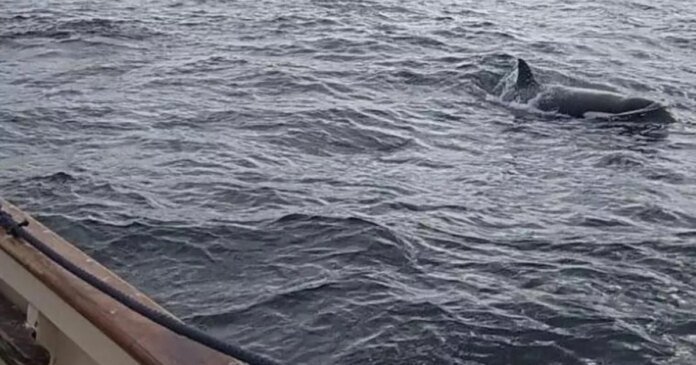A caution has been issued following multiple assaults on vessels by orcas. The occurrences off the Spanish coast were labeled as “highly alarming” after two collisions happened within minutes of each other. Numerous orca pods have been sighted in the waters of Galicia in northwest Spain recently.
The initial attack took place at O Grove, located at the mouth of the Arousa estuary, a popular tourist spot. The orcas damaged the rudder of the ‘San Pedro’ vessel around 6:15 pm that day.
The skipper informed a Spanish newspaper, Faro de Viga, that they felt two impacts around 6:15 pm, discovering that two orcas had damaged the rudder.
Upon closer inspection, the skipper and the other four crew members observed a seven-meter-long orca and a smaller one swimming alongside it. San Pedro, a wooden galleon, was en route to meet other traditional boats from Combarro, slowing down to set sail when the attack occurred. The vessel had to be towed back to port by Maritime Rescue, with no injuries reported.
After San Pedro was safely towed, it returned to sea as another boat had reported a leak due to an orca attack near the island of Ons. This second boat was also towed to port. It is believed that the same orcas, a mother and her calf, were involved in this subsequent incident.
One crew member expressed fear upon realizing that the killer whales were striking the boat. The orcas typically feed on bluefin tuna and octopus, with experts noting frequent interactions between orcas and boats as they migrate between various regions.
A scientist mentioned that the continuous movement of orcas between different areas leads to interactions with recreational boats. This behavior was described as “normal” for orcas, and caution was advised for boats in the area.
The scientist emphasized that wild animals like orcas are unpredictable and can exhibit behaviors dangerous to humans. It was explained that killer whales are expected in the region until autumn as they pursue prey, necessitating caution and avoidance of approaching recreational ships.
He added that three particularly active orcas on the Galician coast have shown a tendency to engage with boats and are likely to continue doing so.


